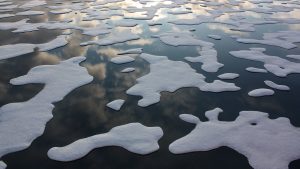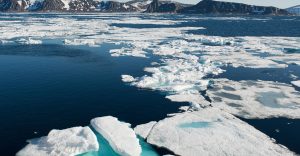Arctic Sea Ice is melting, and it just hit a record low

Srishti Shankar, INN/Delhi, @shankar_srishti
“The amount of ice which covers the northern portion of the Arctic Sea-hit the lowest point since July” according to data published by Alfred Wegener Institute Helmholtz Centre for Polar and Marine Research (AWI).
“Roughly one million square kilometres less of the ocean is covered with ice than in the past seven years,” AWI said.

What is the reason behind the same? Well, the answer to this particular question sits deeply rooted amongst our vague understanding of ‘temperature and climate’. Yes, you heard that correct! many of us even today just fail to understand what exactly is going around us, and how it has become the need of the hour for us to spread awareness about the same.
The shift is caused in part by abnormally high temperatures: July on the east Siberian coast was 6 C warmer than the long-term average in May and June, and the central Arctic has recorded days that are up to 10 C warmer than average. The Arctic community of Verkhoyansk, located in Russia’s northeast, topped 38 C for the first time in recorded history during the summer solstice in June.
“The more of this melting we have the more we expect extreme weather”- the study formulated. Increased sea ice melt also results in a hotter planet; dark ocean water absorbs the sun’s energy, whereas white ice reflects it, so less ice cover means more heat can be collected by oceans.

F123E4 Norway, Barents Sea, Svalbard, Sjuoyane, Seven Islands. Northeast-Svalbard Nature Reserve. (80°49’06 N 21°31’36 E) Flow ice.
We are definitely putting more heat into the entire earth system, in spite of having the balance disrupted. It is the ecosystem of various polar animals found there, which has suffered to a great extent.
Researchers from nearly 20 countries have been travelling alongside Arctic sea ice on an icebreaker since October 2019 as part of the MOSAiC expedition- coordinated by AWI.
They’ve observed how sea ice has melted and will now observe how it freezes over again in the coming months. Travelling through the Arctic took less time than expected because the ice melted so quickly, one of the researchers said- “The record low we are showing comes from satellite data, but the expedition gives us insight into why that is happening”.

